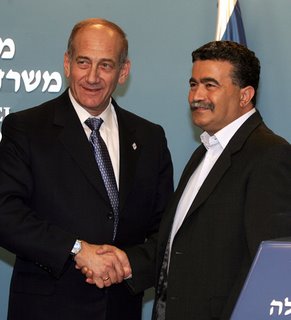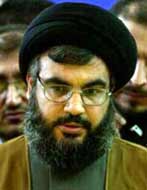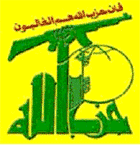What will be the political results of this war? Who has lost, who has won? What do these events augur for the future of Israel and the Middle East in general?
In military terms the war has come to a temporary halt without a clearcut victory on either side. This counts as a de facto Israeli defeat since it was inconceivable not only to their US allies but to the Israelis themselves that the all-powerful and American-supplied IDF could be stopped in its tracks by a despised group of Arabic militants.
The war was allowed to continue as long as it did in order to provide time for an Israeli military victory. When initial Israeli attacks into south Lebanon met with stiff resistance the Israelis asked for more time to finish the job. The US and Britain (PM Tony Blair, if not his Labour Party) stalled on ceasefire negotiations to give the Israelis their chance. The additional time led to more Israeli casualties on the ground (and many more Lebanese civilian casualties from the air) but there was no noticeable improvement in the Israeli military situation. With world opinion growing ever more hostile the Israeli demands for more time could not be sustained indefinitely. An initial, one-sided, and deeply-flawed ceasefire proposal has now been replaced with something slightly, but not much, better. No doubt the young Israeli reservists who have been bearing the brunt of the difficult fighting will be quietly relieved. The angry perception of military failure, however, will lead to a political firestorm in Israel.
How will Israel react?
 PM Ehud Olmert and Minister of Defense Amir Peretz
PM Ehud Olmert and Minister of Defense Amir PeretzPrime Minister Ehud Olmert is definitely on the way out. Calls for his resignation have already been raised in the Knesset and it is highly unlikely he can long survive the political fallout from this war. Look for a bitter war of words in the Israeli press between civilian and military leaders as each side blames the other. If Olmert goes, which is almost certain, we can expect the sacking or perhaps pre-emptive resignation of the IDF Commander, Dan Halutz. Halutz, the first Israeli CIC from the air force, believed in winning wars from the air and was the architect of the devastating airstrikes on Lebanon which caused so many civilian casualties and which roused world opinion to a deafening chorus of outrage.
 Dan Halutz, Israeli military commander in chief
Dan Halutz, Israeli military commander in chiefOrdinary Israelis were astounded and angry at the world’s disapproval (after all, they had been getting away with murder on the ground for decades) and could not understand how they were suddenly losing the PR battle around the world. Lose it they did, and definitively so, in spite of the best efforts of the US media to mislead, as usual, the public at home. Not only in the Muslim world – which has few if any illusions about Israel – but also in places as far apart as China, Russia, South America, Africa, India, almost any country one might care to name, the Israelis were being seen on the world’s TV screens as brutal aggressors, murderers of women and children, heartless attackers of fleeing refugees and ambulances and aid convoys. It will take years, perhaps a generation, for Israel to expunge these negative images.
Lebanon and Hizbullah
 Sayyid Hassan Nasrullah, leader of Hizbullah
Sayyid Hassan Nasrullah, leader of HizbullahWithin Lebanon and the wider Arab world (indeed the Islamic world as a whole which embraces non-Arabic nations such as Iran, Afghanistan and Pakistan, also Indonesia and Malaysia, large parts of India and the southern Philippines, not to mention large populations of Islamic emigrants in Europe and North America) Hizbullah comes out as a clear winner as does their charismatic and relatively young leader Hassan Nasrullah. Nasrullah is calm and shrewd and whenever he appeared on al-Manar TV during the crisis he avoided over-the-top emotional tirades and simply warned the Israelis that he would match their bombing attacks with more and more missiles and would possibly target Tel Aviv.
In retrospect, in spite of the loss of civilian lives in Israel (some of them Israeli Arabs with no bomb shelters provided for them to go to) Hizbullah rocket attacks on Israel were not an indiscriminate lashing out at the “Zionist” enemy so much as a measured response to the Israeli bombing of Lebanon. When the Israelis stopped bombing for a 48-hour period Hizbullah stopped sending over rockets. When the Israelis resumed, so did Hizbullah. The short-range Katyusha rockets don’t have the vaunted accuracy of smart bombs but it would appear Hizbullah was actually trying to go after military targets. BBC and CNN reporters in Haifa went on camera in shirt sleeves because the central city was relatively safe whereas their counterparts in Beirut and Tyre and the Bekaa Valley were all wearing flak jackets.
The Israelis have weapon factories and ammunition stores and military installations dotted around the whole northern part of the country as Jonathan Cook, a free-lance writer based in Nazareth has been trying to explain to everybody for the past few weeks but without much success. The Israeli complaint that the “cowardly” Hizbullah were hiding among the civilian population is entirely hypocritical given that the Israelis do exactly the same thing. Western reporters are prevented from mentioning the existence of military installations in the suburbs of Haifa, Nasiriyah and Nazareth under the draconian censorship rules that Israel imposes on foreign reporters – and which few of these reporters ever remember to mention.
What happens next?
Hizbullah has gained a great deal of respect within Lebanon. This can only add to their growing political influence. The dismissive image of Hizbullah as a Shi’ite militia has been replaced during the course of the war by a wider Lebanese appreciation of the role of Hizbullah as defenders of the country. This perception cuts across all the old sectarian divides. The Israelis were quick to claim (Netanyahu on the BBC Hard Talk program, for example) that the Lebanese Christians and Sunnis were cheering on Israel and hoping for a defeat of Hizbullah. This may have been partly true at the beginning of the war but it is totally untrue now. Even super-safe (supposedly) Jounieh, a Christian enclave north of Beirut, got pounded with bombs as did Sunni and Druze areas as the crazily arrogant and ultimately self-defeating Israeli air campaign went on. In their declared attempt to cut off Hizbullah weapon supply corridors the Israelis shut down the whole transportation and communications infrastructure of Lebanon. What was understood in the beginning as an Israeli attack on Hizbullah soon came to be perceived as an all-out attack on the Lebanese state. And who was standing up to the Israelis? Who was defending Lebanon? Not, you can be sure, the Lebanese army.
 The defiant flag of Hizbullah
The defiant flag of HizbullahIt remains to be seen how far Hizbullah will benefit politically from their (perceived) role as national defenders during the recent war, but benefit they will. That much can be easily predicted. It is indicative of their growing political awareness that they downplay their former religious agenda, never all that strong, and now even field local Christian candidates in election campaigns. These guys are not stupid. They are on their way to becoming major political players in Lebanon, first and foremost, and, by extension, a model for the wider Arab political world. I can’t help but wonder (maybe it’s only me) if they haven’t been stealing a few peeks at the Sinn Fein playbook in Ireland.
America, Bush, GWOT
What about America? Well, what about it – does it really matter? We all know what is going to happen. Bush is like one of the old Bourbon kings of France. He only sees what he wants to see and he learns nothing from changes in events and circumstances. We can expect more of the same blind stupidity. Hizbullah will be ostracized and condemned, again, as an “Islamofascist” terrorist organization. It never has been that, not by any stretch of the imagination. Hizbullah came out foursquare and condemned Al Quaida and the 9/11 attacks, but who cares to remember that now?
America will continue to support Israel and ship them new weapons (but not through Shannon Airport!!) in the hope that a new, better and improved Israeli regime will launch a fresh attack and exterminate these hardy defenders of their native soil. Whatever happened to the old republican virtues (small “r”) in which the Minutemen of Lexington and Concord held a position of respect? In these days of geopolitical conniving and imperial overreach the foundations of the American Republic are conveniently forgotten and set aside, and the same national aspirations which gave rise to the independence of America are denied to others.
The Global War on Terror? It hasn’t been that for some time although Al Quaida is still out there, largely undisturbed. What we have now is a global war on everyone including dissidents, the poor, and ethnic minorities within the USA itself. If you are a Muslim or a black or brown foreigner, God help you.
Sunni regimes
The conservative Sunni regimes in Saudi Arabia, Egypt and Jordan are probably quaking in their boots and with good reason. A successful Shi’ite grassroots organization like Hizbullah that can take on the Israelis and not lose (not losing means you win) is the last thing they need with their own volatile and predominantly poor populations chafing under restrictive quasi-military rule. Hizbullah has aroused feelings of pride and defiance throughout the Arabic world which cuts across the Sunni-Shia divide. It will be interesting to see how they will build upon this support, but build upon it they will. These people are intelligent, disciplined, and dedicated. They won’t be going away anytime soon.
For related articles, please click here